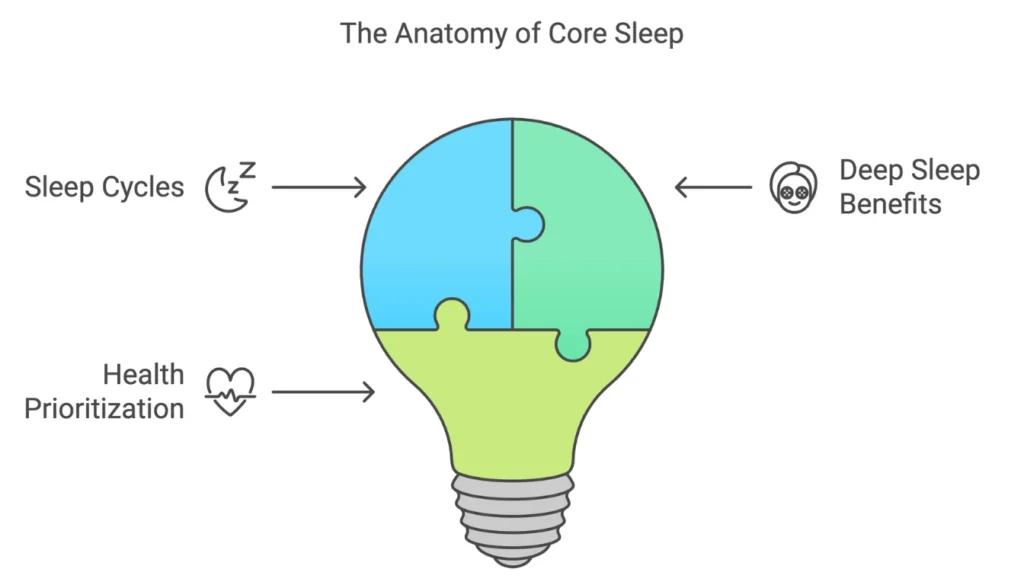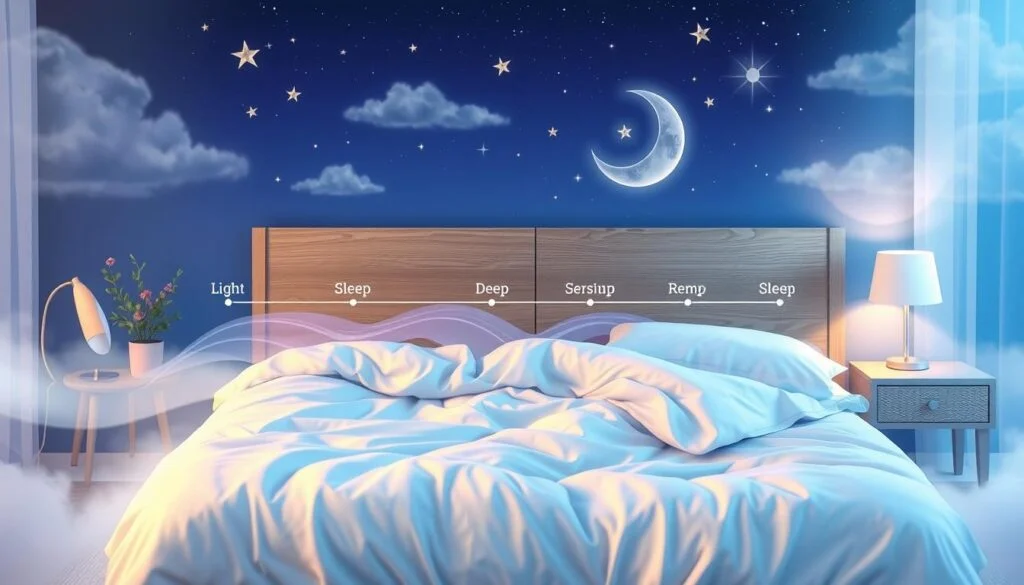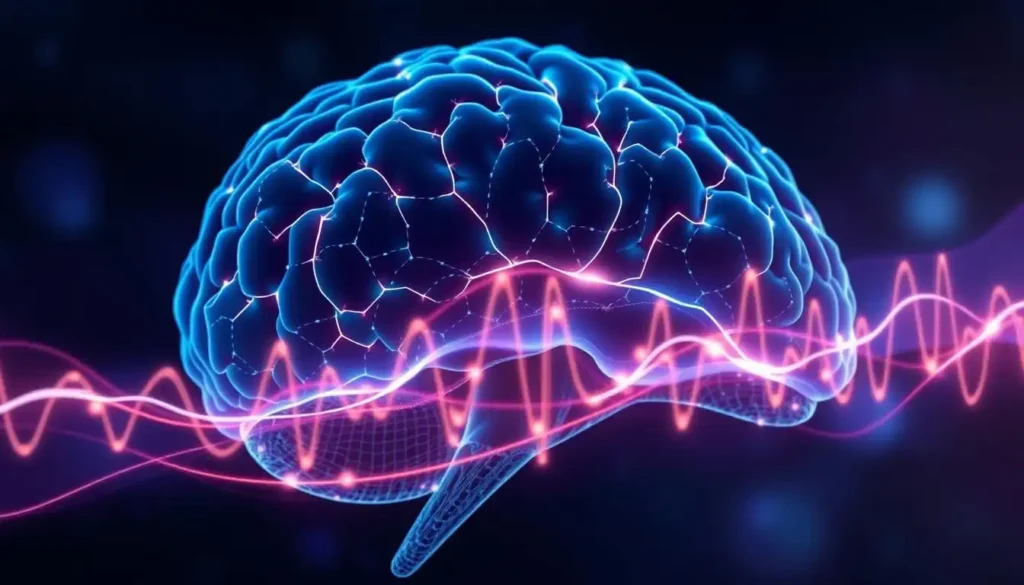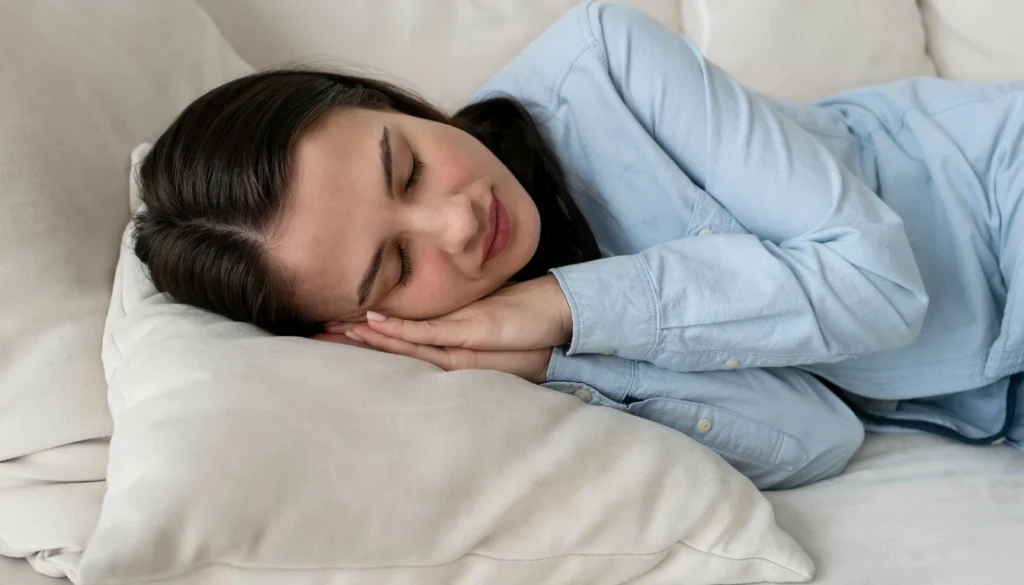What is core sleep, and how can it contribute to better health? Have you ever woken up feeling groggy despite sleeping for hours? We’ve all been there. The secret to feeling refreshed might lie in understanding core sleep. This vital part of our nightly rest is crucial to our overall well-being.
Core sleep is the foundation of a good night’s rest. It’s during this time that our bodies and minds undergo essential restoration. Imagine your body as a busy city – core sleep is when the maintenance crews come out, repairing roads and cleaning up after a long day.
Let’s dive into the world of sleep cycles and stages to uncover the mysteries of core sleep. We’ll explore how deep sleep benefits our health and why it’s so important to prioritize quality rest.

Did you know adults should aim for 6 to 8 hours of core sleep each night? This includes deep and REM sleep, two crucial stages for our health. Interestingly, most people need about 1.5 to 2 hours of deep sleep per night for optimal functioning.
Core sleep isn’t just about quantity – it’s about quality, too. Factors like stress, sleep disorders, and lifestyle choices can all impact how much restorative sleep we get. Understanding and optimizing our core sleep can unlock many health benefits.
Ready to improve your sleep and boost your health? Let’s explore the science behind core sleep and discover how it can transform your life, one night at a time.
Understanding the Basics of Sleep Cycles
Sleep cycles are critical to our nightly rest. They include different repeating sleep stages. Let’s explore the world of sleep and see how these cycles affect our health.
The Four Stages of Sleep
Our sleep is split into four stages, each vital for our health:
- Stage 1: Light sleep (1-7 minutes)
- Stage 2: Deeper sleep (10-25 minutes)
- Stage 3: Deep sleep (20-40 minutes)
- REM sleep: Dream state (10-60 minutes)

NREM and REM Sleep Explained
Sleep cycles switch between NREM and REM sleep. NREM includes stages 1-3, while REM is its stage. A night usually has 4-6 cycles, each lasting 90-120 minutes.
| Sleep Type | Percentage of Total Sleep | Primary Function |
|---|---|---|
| NREM Stage 1 | 5% | Transition to sleep |
| NREM Stage 2 | 45% | Light sleep |
| NREM Stage 3 | 25% | Deep, restorative sleep |
| REM | 25% | Dreaming, cognitive function |
The Importance of Sleep Cycles for Health
Sleep cycles are crucial for our health. NREM stage 3 helps our bodies recover, grow, and fight off illness. REM sleep boosts our brain’s functions, like memory and creativity. If these cycles get disrupted, we might feel tired, have trouble focusing, or get sick.
“Quality sleep is not just about quantity, but also about cycling through all stages of sleep throughout the night.”
Learning about sleep cycles reveals how complex our nightly rest is and how it affects our overall well-being.
What Is Core Sleep?
Core sleep is vital for our sleep needs. It’s the deep rest we need for our minds and bodies to work correctly. This includes the deepest stages of sleep, like deep sleep and REM sleep.
We need 6-8 hours of core sleep to stay healthy and fully functional. During this time, our bodies do essential things like fix tissues, make memories, and balance hormones. Good core sleep quality is key for a robust immune system and overall health.

| Sleep Stage | Percentage of Total Sleep | Duration (8-hour night) |
|---|---|---|
| Light Sleep (N2) | 45% | 3.6 hours |
| Deep Sleep (N3) | 25% | 2 hours |
| REM Sleep | 25% | 2 hours |
| Other (N1) | 5% | 0.4 hours |
Core sleep is crucial for our daily life. It’s when our brains sort out information, make memories, and prepare for tomorrow. The quality of our core sleep affects how we think, feel, and recover from the day.
To get enough core sleep, we must focus on sleep quality. This means making our sleep space comfy, keeping a regular sleep schedule, and avoiding things that mess with our sleep. By doing these things, we can make the most of our sleep time.
The Science Behind Deep Sleep
Deep sleep, also known as slow-wave sleep, is critical to our health and happiness. It slows down our brain waves, helping our bodies and minds recover.
Slow Wave Sleep and Brain Activity
Slow-wave sleep features slow brain waves with a 0.5 to 2 Hertz frequency. These delta waves show that our brain is less active, which is essential for rest. Adults spend up to 20% of their night in deep sleep, usually within an hour of falling asleep.

Ai image: deep sleep brain activity
Physical Restoration During Deep Sleep
Deep sleep is crucial for our bodies to repair and recharge. It helps fix tissues, boost the immune system, and manage hormones. Top athletes know that slow-wave sleep is critical to refueling their energy. Not getting enough deep sleep can tire us and weaken our immune system.
Cognitive Benefits of Deep Sleep
Deep sleep is also great for our brains. It helps us remember things and keeps our brains working well. If we don’t get enough deep sleep, it could lead to serious brain diseases like Alzheimer’s and Parkinson’s.
| Age Group | Deep Sleep Duration |
|---|---|
| Under 30 | Up to 2 hours |
| 30-65 | 45-90 minutes |
| Over 65 | 30 minutes or less |
Learning about deep sleep shows how vital it is for our health. Focusing on quality sleep boosts our physical and mental health, leading to a better life overall.
Core Sleep vs. Optional Sleep: Key Differences
Knowing the difference between core and optional sleep is vital when discussing sleep quality. Core sleep is central to our rest, while optional sleep is extra.
Core sleep is mostly deep sleep and happens in the first three sleep cycles at night. This is when our bodies fix and recharge. Optional sleep comes later in the night.
| Aspect | Core Sleep | Optional Sleep |
|---|---|---|
| Timing | First 3 sleep cycles | The remainder of the night |
| Importance | Essential for functioning | Beneficial but not crucial |
| Sleep Stages | More deep sleep (NREM) | More light sleep and REM |
| Age-Related Changes | Less affected by aging | More pronounced reduction |
Adults need 6 to 8 hours of core sleep each night. This includes deep sleep and REM sleep, which are key for our brains and bodies. More deep sleep happens early in the night.
Knowing these differences helps us make better sleep choices. Focusing on core sleep ensures our bodies and minds get the rest they need, leading to better health and performance.

The Role of Core Sleep in Physical Health
Core sleep is crucial to our physical health. It’s when our bodies do vital work to keep us well. Let’s see how core sleep helps with tissue repair, boosts the immune system, and regulates hormones.
Tissue Repair and Growth
Core sleep releases human growth hormone, crucial for fixing and growing tissues. This helps heal muscles, bones, and organs. Athletes and those recovering from injuries see significant benefits from good core sleep, as it speeds up healing.
Immune System Boost
Core sleep strengthens our immune system by producing cytokines. These proteins fight infections and reduce swelling. Adults need 1.5 to 2 hours of deep sleep each night for a solid immune system.
Hormone Regulation
Core sleep is critical for balancing hormones. It keeps cortisol (stress hormone), insulin (blood sugar), and leptin (hunger control) in check. This balance is vital for staying healthy, managing stress, and avoiding chronic diseases.
| Sleep Stage | Duration | Benefits |
|---|---|---|
| Core Sleep | 1.5 – 2 hours | Tissue repair, immune boost, hormone regulation |
| Light Sleep | 4 – 5 hours | The transition between wake and deep sleep |
| REM Sleep | 1.5 – 2 hours | Memory consolidation, cognitive function |
To stay physically healthy, aim for 20-25% deep sleep. Sleep quality, stress, and lifestyle affect core sleep. Good sleep habits can boost your body’s repair and regulation processes.
Core Sleep and Mental Well-being
Core sleep is vital to our mental health. It helps us remember things, learn new skills, and solve problems. It’s not just about feeling tired or awake. It’s about keeping our minds sharp and our emotions in check.
Studies show core sleep boosts our mental health. For example, people who slept for eight hours after solving complex problems found creative solutions 60% more often. This shows how core sleep makes us more innovative and intelligent.
Core sleep also helps us deal with our feelings. Without enough sleep, we might feel moody or stressed. That’s why good sleep habits are vital for staying emotionally balanced.
| Aspect of Mental Well-being | Impact of Core Sleep |
|---|---|
| Memory Consolidation | Enhances ability to retain new information |
| Problem-solving | Increases chances of finding novel solutions by 60% |
| Emotional Regulation | Improves mood stability and stress management |
| Cognitive Function | Boosts concentration and learning capabilities |
Adults need 6 to 8 hours of core sleep each night for good mental health. This includes 1.5 to 2 hours of deep sleep, which is critical for brain health. Focusing on core sleep helps maintain mental clarity, emotional balance, and overall well-being.
Factors Affecting Core Sleep Quality
Sleep quality is crucial to our health and happiness. We’ll examine what affects our core sleep, including age, sleep setting, and daily habits.
Age-related Changes in Sleep Patterns
Sleep changes as we age. People in their 20s and 30s need less sleep than babies and teens. Every year, we lose some deep sleep, which can harm our brain health. So, it’s vital to maintain good sleep habits as we age.
Environmental Influences
Our sleep setting also shapes our sleep. The room’s temperature, comfort, and noise matter a lot. A calm, quiet, comfy room helps us sleep better.
Lifestyle Habits
Our daily habits affect our sleep. Sticking to a regular sleep schedule, getting sunlight, and managing stress helps us sleep well. Avoiding caffeine, eating right, and cutting screen time before bed also boost our sleep.
| Factor | Impact on Core Sleep |
|---|---|
| Age | 1% annual reduction in deep sleep |
| Environment | Temperature and comfort affect sleep quality |
| Lifestyle | A regular sleep schedule improves core sleep |
Knowing these factors helps us improve our core sleep. This leads to better health and happiness.
Optimizing Your Sleep for Better Core Sleep
Sleep is vital to our health; improving our core sleep can change everything. Let’s explore some easy tips for improving our sleep habits and setting up the ideal sleep space.
Start by setting a regular sleep schedule. Our bodies love routine, so try to sleep and wake up simultaneously every day. This will help keep your body clock in check and boost your core sleep quality.
Then, think about your sleep space. Keep your bedroom calm, dark, and quiet. Choose comfy bedding and pillows that support you. These changes can help you sleep better.
- Set the thermostat between 60-67°F (15-19°C) for optimal sleeping conditions.
- Use blackout curtains or an eye mask to block out light
- Consider using a white noise machine to mask disruptive sounds
Make a calming bedtime routine to tell your body it’s time to sleep. This could be reading a book, taking a warm bath, or doing gentle stretches. Stay away from screens before bed, as the blue light can affect your sleep cycle.
“A good laugh and a long sleep are the best cures in the doctor’s book.” – Irish Proverb
Improving your sleep is a process. It might take some time to figure out what works for you, but the perks of better core sleep are massive. Sweet dreams!
Sleep Disorders and Their Impact on Core Sleep
Sleep disorders can interfere with core sleep, which is critical for our health and happiness. Let’s examine common sleep issues, their diagnoses, and available treatments.
Common Sleep Disorders
There are many sleep disorders, each affecting core sleep differently. Insomnia, which makes it hard to fall or stay asleep, affects many Americans. Sleep apnea, where breathing stops and starts while asleep, can mess up deep sleep. Other issues include restless leg syndrome and narcolepsy.
Diagnosis and Treatment Options
Getting a correct sleep diagnosis is critical to finding the proper treatment. Sleep studies in labs or at home help determine sleep disorders. They track brain waves, eye movements, and other vital signs while you sleep. Treatment depends on the disorder but might include changing your lifestyle, taking meds, or using devices like CPAP machines for sleep apnea.
When to Seek Professional Help
If you keep having trouble sleeping, it’s time to talk to a sleep expert. Look out for signs like chronic insomnia, loud snoring, gasping for air while asleep, or feeling tired during the day. Don’t ignore these signs – getting help for sleep disorders can boost your core sleep and life quality.
| Sleep Disorder | Prevalence | Impact on Core Sleep |
|---|---|---|
| Insomnia | 30% of adults | Reduces total sleep time |
| Sleep Apnea | 20% of obese adults | Disrupts deep sleep stages |
| Restless Leg Syndrome | 5-10% of adults | Delays sleep onset |
Conclusion
We’ve looked into how core sleep affects our sleep health. Core sleep makes up about 20-25% of our sleep time. Our bodies must fix and refresh themselves.
Our bodies release Human Growth Hormone during this stage. This hormone is key for fixing muscles and tissues.
Knowing how different sleep stages work is essential for better sleep. REM sleep helps our brains grow and be creative. Light sleep helps us move from being awake to deep sleep. This mix is critical for keeping our minds sharp, emotions stable, and our immune system strong.
To get better sleep, try sleeping at the same time every night and having a calming bedtime routine. Make your bedroom sleep-friendly, reduce screen time before bed, and manage stress to improve your core sleep. Remember, your sleep needs change with age, health, and lifestyle, so adjust your sleep plan.
Focusing on core sleep and using these tips can help us maximize our rest and recovery. Taking care of our sleep health means taking care of our overall well-being. It helps us live a more energetic, productive, and healthy life.
Read More: Top 10 Bedtime Routines for Adults to Try Tonight






